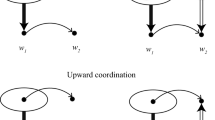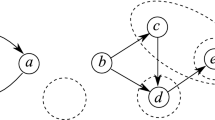Abstract
The role of measure theoretic atomicity in common cause closedness of general probability theories with non-distributive event structures is raised and investigated. It is shown that if a general probability space is non-atomic then it is common cause closed. Conditions are found that entail that a general probability space containing two atoms is not common cause closed but it is common cause closed if it contains only one atom. The results are discussed from the perspective of the Common Cause Principle.
Similar content being viewed by others
References
Arntzenius, F. (1993). The Common Cause Principle. PSA 1992, 2, 227–237.
Butterfield, J. (1989). A space-time approach to the Bell inequality. In J. Cushing & E. McMullin (Eds.), Philosophical consequences of quantum theory (pp. 114–144). Notre Dame: University of Notre Dame Press.
Butterfield, J. (2007). Stochastic Einstein locality revisited. The British Journal for the Philosophy of Science, 58, 805–867.
Cartwright, N. (1987). How to tell a common cause: Generalization of the conjunctive fork criterion. In J. H. Fetzer (Ed.), Probability and causality (pp. 181–188). Dordrecht: Reidel Pub. Co.
Chang, H., & Cartwright, N. (1993). Causality and realism in the EPR experiment. Erkenntnis, 38, 269–290.
Cushing, J., & McMullin, E. (Eds). (1989). Philosophical consequences of quantum theory. Notre Dame: University of Notre Dame Press.
Gyenis B., & Rédei, M. (2004). When can statistical theories be causally closed? Foundations of Physics, 34, 1285–1303.
Gyenis, B., & Rédei, M. (2011b). Causal completeness of probability theories—results and open problems. In J. Williamson, P. McKay Illari & F. Russo (Eds.), Causality in the sciences (pp. 526–539). Oxford: Oxford University Press.
Gyenis, B., & Rédei, M. (2011a). Causal completeness of general probability theories. In M. Suarez (Ed.), Probabilities, causes and propensities in physics, synthese library (pp. 157–171). Berlin: Springer.
Gyenis, Z., & Rédei, M. (2011). Characterizing common cause closed probability spaces. Philosophy of Science, 78, 393–409.
Henson, J. (2005). Comparing causaility principles. In Studies in the history and philosophy of modern physics (vol. 35, pp. 519–543).
Hofer-Szabó, G. (1997a). The formal existence and uniqueness of the reichenbachian common cause on hilbert lattices. International Journal of Theoretical Physics, 36, 1973–1980.
Hofer-Szabó, G. (1997b). Reichenbach’s Common Cause definition on hilbert lattices. International Journal of Theoretical Physics, 37, 435–443.
Hofer-Szabó, G., Rédei, M., & Szabó, L. E. (1999). On Reichenbach’s Common Cause Principle and Reichenbach’s notion of common cause. The British Journal for the Philosophy of Science, 50, 377–398.
Holland, S. S. (1963). A Radon-Nikodym theorem in dimension lattices. Transactions of the AMS, 108, 66–87.
Hoover, K. D. (2003). Non-stationary time series, cointegration and the Principle of the common cause. The British Journal for the Philosophy of Science, 54, 527–551.
Johnson, R. A. (1970). Atomic and nonatomic measures. Proceedings of the American Mathematical Society, 25(3), 650–655.
Kalmbach, G. (1983). Orthomodular lattices. London: Academic Press .
Kitajima, Y. (2008). Reichenbach’s Common Cause in an atomless and complete orthomodular lattice. International Journal of Theoretical Physics, 47, 511–519.
Placek, T. (2000a). Is nature deterministic? Cracow: Jagellonian University Press.
Placek, T. (2000b). Outcomes in branching space-time and GHZ-Bell theorems. The British Journal for the Philosophy of Science, 50, 349–375.
Placek, T. (2000c). Stochastic outcomes in branching space-time. An analysis of Bell theorems. The British Journal for the Philosophy of Science, 51, 445–475.
Rédei, M. (1995a). Logical independence in quantum logic. Foundations of Physics, 25, 411–422.
Rédei, M. (1995b). Logically independent von Neumann lattices. International Journal of Theoretical Physics, 34, 1711–1718.
Rédei, M. (1998). Quantum logic in algebraic approach, volume 91 of fundamental theories of physics. Dordrecht: Kluwer.
Rédei, M., & Summers, S. J. (2007). Quantum probability theory. Studies in the History and Philosophy of Modern Physics, 38, 390–417.
Reichenbach, H. (1956). The direction of time. Los Angeles: University of California Press.
Salmon, W. C. (1980). Probabilistic causality. Pacific Philosophical Quarterly, 61, 50–74.
Salmon, W. C. (1984). Scientific explanation and the causal structure of the world. Princeton: Princeton University Press.
Salmon, W. C. (1978). Why ask “why?”? In Proceedings and addresses of the American Philosophical Association, vol. 51, pp. 683–705.
Sober, E. (1984). Common cause explanation. Philosophy of Science, 51, 212–241.
Sober, E. (1988). The principle of the common cause. In: Fetzer, J. H. (Ed.), Probability and causality (pp. 211–228). Boston: Reidel Pub. Co.
Sober, E. (2001). Venetian sea levels, British bread prices, and the principle of common cause. The British Journal for the Philosophy of Science, 52, 331–346.
Sober, E. (2008). Evidence and evolution. Cambridge: Cambridge University Press.
Spohn, W. (1991). On Reichenbach’s Principle of the Common Cause. In W. Salmon & G. Wolters (Eds.), Logic, language and the structure of scientific theories. Pittsburgh: University of Pittsburgh Press.
Suppes, P. (1970). A probabilistic theory of causality. Amsterdam: North-Holland.
Uffink, J. (1999). The principle of the common cause faces the Bernstein paradox. Philosophy of Science, Supplement, 66, 512–525.
Van Fraassen, B. C. (1982a). Rational belief and the Common Cause Principle. In: R. McLaughlin (Ed.). What? Where? When? Why? (pp. 193–209). Dordrecht: Reidel Pub. Co.
van Fraassen, B. C. (1982b). The Charybdis of realism: Epistemological implications of Bell’s inequalities. Synthese, 52, 97–113. reprinted in Cushing and Mc Mullin 1989 pp. 97–113.
Wronski, L. (2010). The Common Cause Principle. Explanation via screeing off. PhD thesis, Institute of Philosophy, Jagiellonian University, Cracow, Poland.
Acknowledgments
We thank the audience of the “Causes and Tenses—Formal Perspectives” Workshop, Department of Philosophy, Jagiellonian University, Cracow, Poland September 10–11, 2011, for discussion related to the topic of this paper. Work supported in part by the Hungarian Scientific Research Found (OTKA), contract number: 100715.
Author information
Authors and Affiliations
Corresponding author
Rights and permissions
About this article
Cite this article
Gyenis, Z., Rédei, M. Atomicity and Causal Completeness. Erkenn 79 (Suppl 3), 437–451 (2014). https://doi.org/10.1007/s10670-013-9456-1
Received:
Accepted:
Published:
Issue Date:
DOI: https://doi.org/10.1007/s10670-013-9456-1




